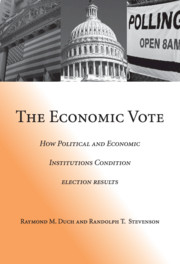Book contents
- Frontmatter
- Contents
- Preface
- 1 Introduction
- Part I Describing the Economic Vote in Western Democracies
- 2 Defining and Measuring the Economic Vote
- 3 Patterns of Retrospective Economic Voting in Western Democracies
- 4 Estimation, Measurement, and Specification
- Part II A Contextual Theory of Rational Retrospective Economic Voting: Competency Signals
- Part III A Contextual Theory of Rational Retrospective Economic Voting: Strategic Voting
- Part IV Conclusion and Summary
- Appendix A
- Appendix B
- Appendix C
- References
- Index
- Cambridge Cultural Social Studies
3 - Patterns of Retrospective Economic Voting in Western Democracies
Published online by Cambridge University Press: 06 July 2010
- Frontmatter
- Contents
- Preface
- 1 Introduction
- Part I Describing the Economic Vote in Western Democracies
- 2 Defining and Measuring the Economic Vote
- 3 Patterns of Retrospective Economic Voting in Western Democracies
- 4 Estimation, Measurement, and Specification
- Part II A Contextual Theory of Rational Retrospective Economic Voting: Competency Signals
- Part III A Contextual Theory of Rational Retrospective Economic Voting: Strategic Voting
- Part IV Conclusion and Summary
- Appendix A
- Appendix B
- Appendix C
- References
- Index
- Cambridge Cultural Social Studies
Summary
The analyses of the 163 surveys described in the previous chapter generate a wealth of data: a total of 678 economic vote measures for 113 political parties in eighteen countries over a twenty-two–year period. As we pointed out in the Introduction, the theoretical and empirical focus of this book is on explaining contextual variation in the economic vote, as defined in the previous chapter. Before proceeding to these efforts, we address two particularly critical empirical tasks in this chapter. First, is there a significant and pervasive economic vote in advanced democracies? Second, is there significant contextual variation in the economic vote that is sufficiently interesting to justify a book-length treatment?
The first question we posed is not simply rhetorical. There is considerable skepticism as to the importance of economic voting (a recent statement is Cheibub and Przeworski, 1999). If, as some would argue, economic voting were apparent in only a small number of countries or elections, or if it were wildly inconsistent in direction and magnitude, then there would be little reason to try to understand how contextual factors might affect it. Part of this skepticism concerns the importance of economic evaluations relative to other influences on the vote. Again, if economic evaluations have a much weaker influence on the vote than other factors, then our time would be better spent studying contextual variation in those factors. Readers can probably anticipate the answers to these questions.
- Type
- Chapter
- Information
- The Economic VoteHow Political and Economic Institutions Condition Election Results, pp. 62 - 93Publisher: Cambridge University PressPrint publication year: 2008
- 1
- Cited by

